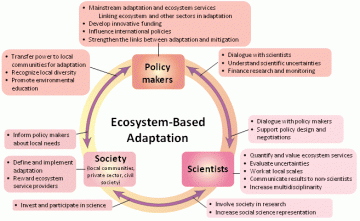Ecosystem based adaptation: a multi-stakeholder affair

Ecosystem-based adaptation (EBA) is defined as “the adaptation policies and measures that take into account the role of ecosystem services in reducing the vulnerability of society to climate change, in a multi-sectoral and multiscale approach”. EBA involves different stakeholders such as national and regional governments, local communities, private companies and NGOs in addressing the different pressures on ecosystem services (e.g. land use and climate change), and in managing ecosystems to increase the resilience of people and economic sectors to climate change (Vignola et al., 2009).
EBA necessitates such a multi-stakeholder approach, as ecosystems underpin the functions of diverse sectors, and different social groups depend on the services provided by the same ecosystems in a given landscape. Furthermore, ecosystem benefits and management costs can occur in different locations and affect different sectors and social segments.
For example, local communities depend on forest goods for their livelihoods (e.g. timber, NTFPs), while the same forests can support private sector tourism or timber harvesting activities that align with national or regional development priorities. Furthermore, the hydrological and other regulating ecosystem services of these forests are beneficial to other sectors such as agriculture (e.g. base flow and flood flow regulation, erosion control) and energy (e.g. siltation regulation for hydroelectricity facilities).
Forests can play a role for the adaptation of different sectors and stakeholders. But in order for this to occur, they should be managed accordingly and their vulnerability to anthropogenic and other pressures should be reduced. It should also be acknowledged that trade-offs might not only occur between alternative land-uses (e.g. short term development versus long term adaptation) but also between ecosystem services, and between stakeholder adaptation priorities at different spatial and temporal scales. Different stakeholders can perceive different benefits from the same ecosystem processes which can be complementary but also competitive.
Considering the spatial complexity of ecosystem service delivery is essential in many cases, especially when ecosystems span across different regions. For example, the success of restoring flood plains in a locality for reducing the risk of flooding also depends on upstream river management. This illustrates the dependence of local initiatives on what occurs at larger scales.
There is a need to better understand the potential of EBA for different stakeholders and the related benefits, trade-offs and uncertainties. We need to evaluate when, where and for what problems EBA is an effective and efficient approach and science will play a critical role in this. Science can inform policy makers, but also other stakeholders such as civil society and local communities, about assessing vulnerabilities, identifying response options and designing adaptation strategies.
To bring together the different types of EBA stakeholders, an international workshop entitled “Adaptation to Climate Change: the role of Ecosystem Services” was held in November 3–5, 2008, in the International Centre for Tropical Agriculture Research and Higher Education (CATIE) in Turrialba, Costa Rica. Eighty participants came from 24 countries (mostly Latin American) and 56 institutions (local communities, NGOs, scientific organizations, government agencies, public and private firms, and international agencies for cooperation) to discuss the role of ecosystem services in adaptation to climate change.
Participants presented and discussed a wide array of perspectives and experiences related to ecosystem services and adaptation to climate change in Latin America, including community management, payment for ecosystem services, and insurance schemes. This dialogue allowed participants to identify critical common issues, such as the needs for:
- Institutional changes;
- Better understanding of uncertainties and strategies to cope with them;
- Improved communication between scientists and decision makers;
- Strengthened linkages between sectors and scales.
Key messages were elaborated for three groups of EBA stakeholders: (1) national policy-makers (2) local communities, private sector and other members of civil society, (3) scientists.

Key messages to stakeholders related to ecosystem-based adaptation (EBA). From Vignola et al. (2009).
(0) Comments
There is no content